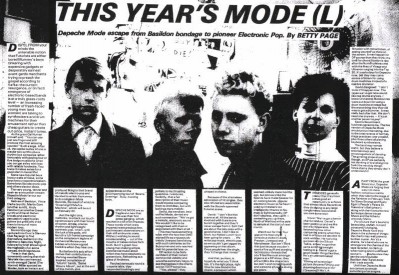In the fourth extract from my Eighties memoir, another brand-new pop group gets interviewed by Sounds‘ Betty Page, who is fast establishing herself as the go-to writer for up-and-coming New Romantics and Futurists (early adopters of the latest in electronic music gadgetry).

Depeche Mode had named themselves after a French fashion magazine. It was an unlikely handle for a bunch of Essex boys, but they had made the wise decision to sign to the independent label Mute, run by electronic music wizard and producer Daniel Miller.
When I first met the band, in an overflowing stock room at Rough Trade records, they were bundles of nerves. They looked like choirboys – and indeed one of them confessed he had been. Natives of Basildon, Vince Clarke (synth), Martin Gore (another synth), Andy Fletcher (bass synth) and David Gahan (vocals and electronic percussion) had once played guitars – but then discovered the joys of modern toys.
Six months earlier they had secured a Saturday night residency at Croc’s Glamour Club in Rayleigh, Essex, before venturing down to the rough-and-ready Bridgehouse Tavern, which was more accustomed to the sound of football hooligans. It was in that dark, unromantic setting that their fairytale rise commenced.
Synthesiser Svengali Daniel Miller took an instant liking to Depeche Mode’s brand of melodic electro-pop and put them straight into the studio – the result of which was their first single, the featherlight Dreaming of Me.
Sitting between piles of vinyl, the quartet looked like rabbits caught in the headlights. They had never done an interview before and all I could extract from them were a few polite observations accompanied by furious blushing.
This is roughly how it went.
Do you feel confident of your commercial appeal?
Silence.
Would you be pleased if you were asked to appear on Top of the Pops tomorrow?
“Yes please!”
Are you Futurists?
“I don’t like that scene at all,” said David. “We write pop music – electro-pop.”
Would you say your music is a little like Orchestral Manoeuvres in the Dark, but with more melody?
“We wouldn’t like to be categorised with them or associated with them at all,” said David. “Orchestral Manoeuvres were put down for using a drum machine on stage but the worst thing they ever did was to get a drummer. It was really bad after that. We don’t need one anyway – it’s just another person to pay!”
Drummers would become dinosaurs of rock for this new breed of electro-popper, who were changing the face of music from their bedrooms. With just one finger and a reasonably priced synthesiser, they could produce the most amazing sounds.
For Depeche Mode, it was the only way. Theirs was a quiet revolution, but a revolution all the same.
I interviewed the band again a few months later, after their first two singles had become hits. What a transformation. I watched them at work in the studio larking about with producer Daniel Miller; Vince sitting confidently behind the mixing desk and Martin Gore in shorts, singing the harmonies for I Just Can’t Get Enough.
They told me they held “gigs” in the studio when things got too much for them and played me a tape of one of these impromptu sessions. It started off as raw electro-punk with vocals by Andy, segued into cover versions of Simple Simon Says and You’re Gonna Lose That Girl and finished with a sensitive rendition of a popular hymn, thus confirming the suspicion that they were still in touch with their inner choirboys.
Dep Mod, as I liked to call them, were so pristine in those days: Daniel Miller’s pop vision made flesh. In the beginning, their shiny electronic pop was bright and blemish-free – but then the ghastly cocktail known as Instant Fame took hold and the rock-god demons began to drag singer David Gahan into a drugs hell from which he would barely escape with his life…
© Beverley Glick 2005. All rights reserved.
Any idea what date you did this Interview with Depeche Mode ?? I know it’s a long time ago Beverley but any idea ??